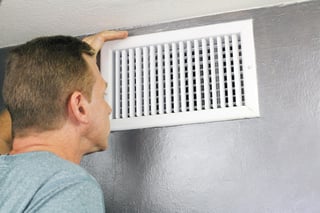 The upstairs is too warm, the downstairs is too cool, and the basement is flat-out cold! Sometimes it can feel like a constant effort to keep home temperatures balanced. That’s when homeowners think that closing vents to redirect airflow can help. But that’s not really a good idea. Here’s why.
The upstairs is too warm, the downstairs is too cool, and the basement is flat-out cold! Sometimes it can feel like a constant effort to keep home temperatures balanced. That’s when homeowners think that closing vents to redirect airflow can help. But that’s not really a good idea. Here’s why.
Your HVAC System is Designed for Optimal Air Flow
Today’s HVAC systems are precisely designed to accommodate the right amount of airflow for the size homes they’re installed in. That means the ductwork size, location, configuration, and the amount, size, and placement of registers and grilles are all calculated to direct the right volume of air where it’s needed.
The HVAC professionals who took all those factors into consideration were exact in designing your system – it’s not oversized or undersized – it’s just right for your home.
The Importance of Proper Airflow
All the effort goes into designing your HVAC system so it provides the exact airflow needed to heat and cool your home. Your system’s airflow is regulated to distribute warm air to compensate for heat loss during the heating season and cool air to offset heat gain during the cooling season. Closing off air vents will only disrupt that airflow – it will not redirect it to another room or otherwise compensate for heat loss or gain. And it can cost you in the long run.
Closing Air Vents Can Increase Your Energy Bill
Some homeowners reason that if they close vents in unused rooms, that will save on heating or cooling costs by cutting down on how hard the furnace or air conditioner is working. But it doesn’t. Your furnace or AC will continue to work the same amount, but the air pressure in the system will increase. That increased air pressure has to go somewhere, so it is often forced out of small leaks in the system — or could even create leaks in the system. That means that warm or cool air simply escapes from your home. At the same time, your system may actually run longer to do its job. All of which means extra energy spent – energy that you’ll pay for at the end of the month.
Closing Air Vents Prohibits Proper Air Flow
The airflow through your HVAC system is what conducts heating and cooling to all parts of your home. That’s pretty obvious, especially if you’re near a vent when the heat or AC kicks in. But what may not be as obvious is that airflow also returns through the system. Both the air supply – the air that you’re aware of venting into a room – and the return airflow are based on a calculated pressure that keeps the system running smoothly and efficiently. And that translates into effective heating and cooling for your home.
Closing Air Vents Can Damage Your System
If you decide to close off registers or block grilles to interrupt the planned airflow, you’re also forcing the system to adjust to a different pressure than it was designed to handle. You’re asking the whole system to work harder than intended. And that could become problematic. If your system is operating at a sub-par level, that means your overall cooling and heating isn’t going to be as effective. But that’s not where it ends.
If you upset the balance by closing off registers you may create a problem of low airflow, which if severe enough, will damage your furnace and air conditioner. Both of these require a minimum amount of air to work properly and efficiently. The small amount of savings you may gain by not heating or cooling a room or two will be more than offset by the efficiency loss.
If prolonged or severe enough, that low airflow could even cause your furnace to overheat or your AC coil to freeze. If not caught in time, that could even damage your compressor. Now you’ve really got a problem.
An Alternative to Closing Off Vents
If you have rooms or whole areas of your home that you don’t use for part or all of the year, there is a better solution. It’s called zone heating and cooling or zone control. Zone control lets you set different temperatures for different rooms or areas of your home. So, no more closing vents in an attempt to save on fuel costs. Many new home constructions have zone control, but you can also retrofit a home to include it. If that sounds like it might be the right solution for you, talk to a reputable HVAC professional. You can find one in your area using our dealer locator.
Basic Maintenance is Another Alternative
If you don't plan on investing in zone heating and cooling, but you feel your system isn’t working efficiently or providing the comfort you need, take the time to do a little basic maintenance. Start by changing your filters and making sure your units are clean and free of dust and debris. If you’re still not happy with your system’s performance, it may be time to call in the pros for a routine checkup.
Use our convenient dealer locator to find a reliable HVAC professional in your area.





